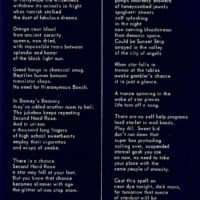for a useful meaning
no starched collar
inked his lines
nor the uptight
narrowness
of the familiar
bank clerk
From a Diary #2
Heavy snow took down the internet, which came back up just now . . . will the power lines go down ? . . . the snow is still falling . . . fingers crossed . . . beautiful to look at though, and the two grandkids will go sledding . . . hear from a friend in Berlin that the sun is out there . . . and so are the sun worshippers . . . plenty of ambulance sirens too . . . no sun here, much less worshippers . . . as to sirens, I haven’t heard one in four weeks . . . glad of that . . . even in normal times they were a regular sound track back in the city . . .
Shared Thoughts Rethought
The grand pyannah, glorious
but somewhat out of tune,
awaits my amateur tickling.
It‘s a great distraction.
Tell me you’re distracted,
mowing down the pages
of your rare old books.
Coping With the Shitstorm #5
David Erdos reads Poem 35—about selfishness and gaining a perspective on it in current conditions—from his forthcoming book, ‘The Corona Collection: 2020 Vision.’
GC CUNY Keeps the Conversation Going:
Workers & Wages with Paul Krugman;
Marlon James on Fantasy Fiction
Why has it been so hard for American workers to make a living? Why haven’t the economy’s gains of the recent past meant higher wages for everyone? This week, as inequality and job insecurity are intensified by the Covid-19 pandemic, take look at “Workers and Wages in America Today” for a long- term perspective. Also, for a change of pace, enjoy a great discussion with Man Booker Prize-winner Marlon James about his venture into fantasy fiction.
From a Diary . . .
I’ve been skimming through a complete collection of Chekhov’s stories. There’s lotsa chaff—small anecdotes published in newspapers from early days that don’t do much and weren’t intended for the ages. But then you come upon “an unpleasantness,” a long story from a later period that stands up like an erection. It’s about a doctor who runs […]
GC CUNY Keeps the Conversation Going:
Economists Emmanuel Saez & Gabriel Zucman;
authors Suketu Mehta & Gary Shteyngart
Economists Emmanuel Saez and Gabriel Zucman talk about how the rich dodge taxes and how to make them pay. And authors Suketu Mehta and zary Shteyngart discuss how American culture is constantly being remade by immigrants.
Coping With the Shitstorm #3
A friend writes from the French countryside: The invisible threat casts a shadow over an otherwise idyllic springtime. When normally one’s own sorrows are cast aside, albeit temporarily, by the blossoming of nature and its infectious sense of hope, this year comes with a malaise which seems to leach all sense of renewal; and so I find myself hesitant in all I do.
Coping With the Shitstorm #2
A friend writes from Berlin: Good news … I received 5000 euros from the city. I could hardly believe it when I looked at my bank account. That will come in handy. Now we simply have to survive. It was very generous to artists who live here, many of whom are wiped out by what has happened. The decisions were made quickly, based simply upon the evidence that an artist truly has been living and working on their art here. It all seems unreal…everything does now.
GC CUNY Keeps the Conversation Going:
Roxane Gay and Katia D. Ulysse
GC Presents: Roxane Gay, a powerful literary voice and one of today’s most-watched cultural critics, joins in a reading and conversation with acclaimed fiction writer Katia D. Ulysse. (Courtesy of GC CUNY’s Public Programs archive.)
GC CUNY Keeps the Conversation Going:
Milanovic, Piketty, Stiglitz, and Krugman
While events are postponed at The Graduate Center of the City University of New York in the heart of Manhattan, videos of recent public programs will be featured from its archive for your enjoyment. The videos provide illuminating discussions in two main categories: insights into current events and conversations with leading writers and artists. (Courtesy of GC CUNY’s Public Programs archive.)
What . ? . No Patti Smith?
Just kidding . . .
Last Breath
There are things / closer than rain / that keep hope alive— /
tenement flowers / seasoned with heartbreak, / chattering weeds / and the silence of fireflies— / things that may not be / more brilliant / than a wine-stained shirt / and crow’s-feet eyes. / But they will do …
‘I Do Not Think. I Am Thought. I Am Thought in Action.’
I am that I am that I happen. /
I am a resultant. /
—a coincidence of fields. /
Am is my here. /
That is I there. /
What am I here for? . . . /
I am here to go. /
When the magnetic fields shift / There / is no here. / I am gone.
And From the Outlaw End of the Writing Spectrum
“At age 84, Plymell continues to write, publish and perform—“doing nuttin”, as he says—from his home in Cherry Valley, New York. His activities keep Plymell in steady correspondence with a crowd of like-minded hellions, including rockabilly’s Bloodshot Bill, Sonic Youth founders Kim Gordon and Thurston Moore, bassist Mike Watt, filmmaker Mark Hanlon, guitarist Bill Nace, photographer Philip Scalia and musicologist Byron Coley. Plymell and his wife, Pam, first happened upon Cherry Valley in late 1969 in coming to visit Allen Ginsberg and Peter Orlovsky at their East Hill farm. Moving there for good in early 1970, the Plymells have set into adding to their immense creative legacy.” – Benito Vila
A Blogpost for the Ages
This was it, Jan. 12, 2017 . . . It began like this: ‘On the day Twitter Fingers is sworn in as the preening el presidente of a tin-pot United States of Trumpistan, enabling him to run the country like a division of his family-held company . . . ‘ and continued with a 17-minute recording of Heathcote Williams reading his poem “The United States of Porn.” That reading alone puts the blogpost in a class of its own.
‘When Tarnish Stalked the Dust of Fabulous Dreams’
Charles Plymell’s poems are hard-core gems dug out of the earth. Yet they seem effortless to me. Without the slightest hint of literary elbow grease, they shine like polished jewels. I should have published more of them back in the day, but at least there was this one. It’s as gorgeous now as it was then.

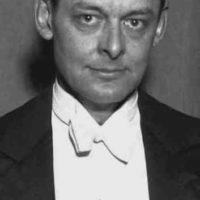

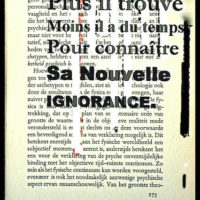

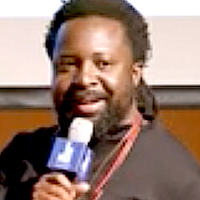
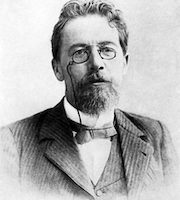









![Heathcote Williams [Photo: JH, 2013]](https://www.artsjournal.com/herman/wp/wp-content/uploads/2017/07/heathcote-williams-photo-copy-200x200.png)
